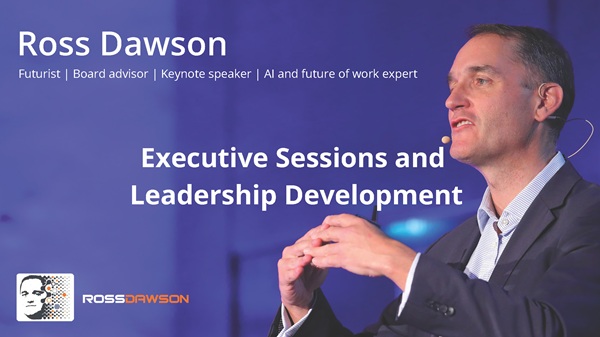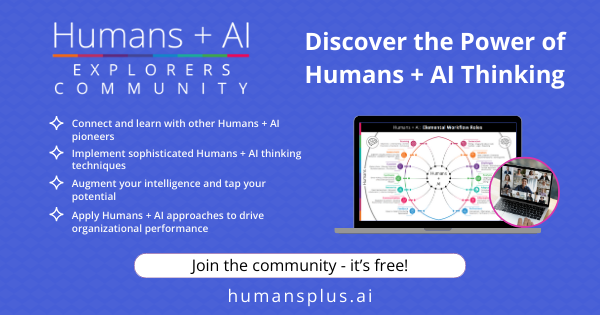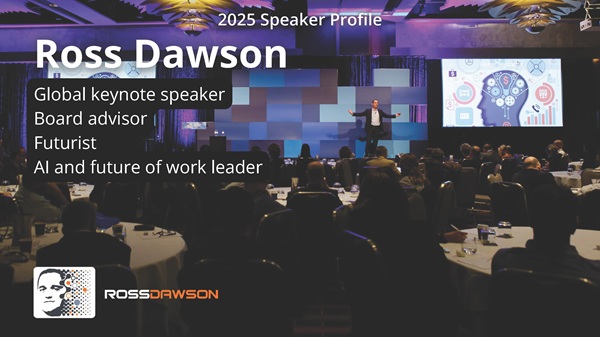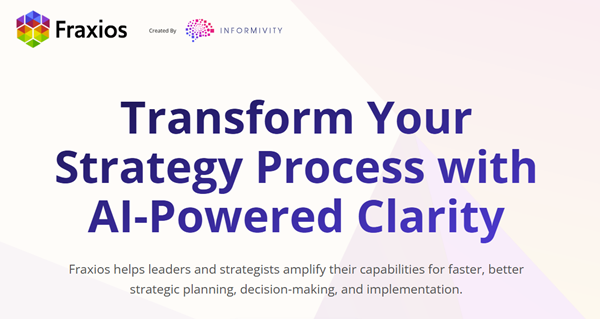“This is about how we need to grow and develop our individual cognition as a complement to AI.”
– Ross Dawson

About Ross Dawson
Ross Dawson is a futurist, keynote speaker, strategy advisor, author, and host of Amplifying Cognition podcast. He is Chairman of the Advanced Human Technologies group of companies and Founder of Humans + AI startup Informivity. He has delivered keynote speeches and strategy workshops in 33 countries and is the bestselling author of 5 books, most recently Thriving on Overload.
Website:
LinkedIn Profile:
Books
What you will learn
- Tracing the evolution of the podcast name and vision
- How chatgpt shifted the AI conversation overnight
- Why humans plus AI is more than just a rebrand
- The mission to amplify human cognition through AI
- Exploring collective intelligence and team dynamics
- Rethinking work, strategy, and value creation with AI
- Envisioning a co-evolved future for humans and machines
Episode Resources
Books
Technologies & Technical Terms
Transcript
Ross Dawson: This is the launch episode of the Humans Plus AI podcast, formerly the Amplifying Cognition podcast, and before that, the Thriving on Overload podcast.
So in this brief episode, I will cover a bit of the backstory and a bit of where we got to where we are today, and calling this Humans Plus AI now—why I think it is so important, what it is we are going to cover, and framing a little bit this idea of Humans Plus AI.
So the backstory is that the podcast started off as Thriving on Overload. It was the interviews I did for my book Thriving on Overload. The book came out in September 2022.
By then, I was still continuing with the Thriving on Overload podcast, continuing to explore this idea of how we can amplify our thinking in a world of unlimited information. Essentially, our brains are finite, but in a world of infinite information, we need to learn the skills and the capabilities to be as effective as possible.
And COVID—we’ll come back to that—but that is a fundamental issue today, which is the reason I wrote the book.
Just three months after the book came out was what I call the ChatGPT moment, when there’s crystallizing progress in AI where I think just about every single researcher and person who’d been in the AI space was surprised or even amazed by the leap in capabilities that we achieved with that model—and of course, so much more since then.
So I quickly wanted to consolidate my thinking, and immediately came on this phrase Humans Plus AI, which reflects a lot of my work over the years.
I have been literally writing about AI, the role of AI agents, and particularly AI and work—for, well, in some ways, a couple of decades. But this was a moment where I felt I had to bring all of my work together.
So fairly soon, I decided I needed to rebrand the podcast to be not just Thriving on Overload. But I still was tied to that theme. So I decided, let’s make this Amplifying Cognition, trying to get that middle ground with integrating the ideas of Humans Plus AI.
How could humans and AI together be as wonderful as possible, but also this idea of Thriving on Overload—this individual cognition—how do we amplify our possibilities?
There was a long list of different names that I was playing with, and one of the other front runners was, in fact, Amplifying Humanity.
And in a way, that’s really what my mission is all about. And what all of these podcasts—the podcast and its various names—is about: how do we amplify who we are, our capabilities, our potential?
Of course, the name Amplifying Humanity sounds a bit diffused. It’s not very clear. So it wasn’t the right name. Or not—there was certainly no right title at the time.
But now, when I take this and say, well, we’re going to call this Humans Plus AI, in a way, I think that the Thriving on Overload piece of that is still as relevant—or even more relevant. That is part of the picture as we bring humans and AI together.
This is about how we need to grow and develop our individual cognition as a complement to AI.
So in fact, when I talk Humans Plus AI, Thriving on Overload, and Amplifying Cognition are really baked into that idea.
So the broad frame of Humans Plus AI is simply: we have humans. We are inventors. We have created extraordinary technologies for many years, and the culmination of that at this point is something that is analogous to our own intelligence and cognitive capabilities.
So this could be seen as challenging, and I think there are, of course, many things that we have to navigate through this. But it is also very much about: what could we do together? The originator, the creator—which is us—and that which we have created. We need to find how these together can be integrated, can be complementary to, can create more possibilities than ever before.
There are many earlier thinkers—prominently Doug Engelbart—who talk about intelligence amplification. And again, that’s really what AI should be about: amplifying our capabilities and possibilities.
There are, of course, many, many risks and challenges with AI, including in governance—conceivably existential risk—in terms of all sorts of ethical issues that we need to address. And I think it’s wonderful there are many people focusing on that.
My particular mission is to be as positive as possible, to be able to focus singularly not on the negatives, whilst acknowledging and understanding those, but looking at what could be possible—who we could become in terms of our capabilities as well as our humanity—and moving forward and trying to provide some kind of a beacon or a light or something to look to in this positive vision for what is possible from humans and AI together.
So this starts with the individual, where we can use AI to develop our skills and our capabilities. We need skill to be able to use that. We want to cover some of the attitudes, what education is required, what are the tools we can use, but also look at other ways to augment ourselves which aren’t necessarily tied to technology.
Still coming back to issues such as awareness, attention, critical thinking—these are all the things that will keep us complements to the technologies as well as possible.
In organizations, there’s many potentials for organizations to reshape, to reform, and bring together humans and AI. Looking at how teams form, looking at ideas of collective intelligence—which, of course, the podcast has looked at for a long time.
To look at the impact of AI, particularly in professional services, the impact of AI on business models and value creation and new organizational structures. And while many people talk about the one-person billion-dollar company, that’s interesting—what’s more interesting is how you get a group of people, small or large, complemented by AI, to create more value than ever before.
This also will look at strategic thinking. So I’ve been focusing very much on AI and strategic decision-making. AI for strategy. Also looking at AI and investment processes. How do we use AI to allocate capital better than ever before, making sure that we are making the right decisions?
So one of the core themes of the podcast will be using these—AI for strategy, strategic thinking, investment—sort of the bigger picture thinking, and being quite specific around that: the approaches, the tactics, the strategies, the techniques whereby everyone from individual entrepreneurs to boards to organizations can be more effective.
We will certainly be delving into work and the nature of how work evolves with both humans and AI involved—what are the structures for how that can happen effectively, what are the capabilities required, how we will see that evolution, and what are some of the structures for sharing value amongst people.
And looking at this bigger, broader level of society—this cognitive evolution. How will our evolution evolve? What is the co-evolution of humans and AI? How can we build this effective collective intelligence at a species level? How can we indeed build collective wisdom?
How can AI support us in being wiser and being able to shape better pathways for ourselves, for communities, for nations, for societies, for humanity?
And also looking at the future—what is the future of intelligence? What is the future of humanity? What is the future of what comes beyond this?
And just the reality—of course, we are moving closer to a transhuman world, where we are going beyond what we have been as humans to who we will be, not least through being complemented by AI.
So that’s some of the many themes that we’ll be exploring. All of them fascinating, deeply important, where this is all the frontiers—where there are no guidelines, there are no established practices and books and things that we can look at. This is being created as we go.
So this is a forum where we will try as much as possible to uncover and to share the best of the thinking and the ideas that are happening in the world in creating the best positive potential from humans and AI together.
So if you want to keep on listening to some of these wonderful conversations I’m having, then please make sure to subscribe to the podcast. Love to hear any feedback you have.
One way is where I spend most of my online time—is LinkedIn, my own personal profile. Or we have the page, LinkedIn page, which we’re just renaming from Amplifying Cognition to Humans Plus AI.
If you really want to engage, then please join the community. There will always be free sections of the community. In fact, all of it is still free for now, and you’ll find like-minded people.
If you find any interest at all in these topics, you’ll find lots of other people who are delving deep with lots to share.
So thank you for listening. Thank you for being part of this journey. I think this is a very, very exciting time to be alive, and if we focus on the positive potential, we have a chance of creating a—
So thank you for being part of the journey. Catch you somewhere along the way.
Podcast: Play in new window | Download






